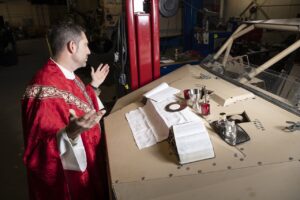
Wherever the Troops Are, the Chaplain Must Be
by LCol the Rev’d Canon Judson Bridgewater
“The padre has come to visit us. He could have been with his family this Christmas but he wanted to be with us,” the Task Force Sergeant-Major (TF SM) said to the troops circling around to meet us.
The Task Force Commander, TF SM, and I had just run from the helicopter landing zone, in full ‘battle rattle’ through the guarded entrance of the massive concrete walls of the compound housing the forward operating base (FOB). Surrounding us lay an ancient city—now in ruins.
Later that evening we flew back from the FOB through the desert to the main camp to participate in the interdenominational Christmas Eve service attended by multinational forces. Highlights of the service included a young American soldier singing Leonard Cohen’s Hallelujah, followed soon after by a German chaplain singing Silent Night in its original language.
Christmas morning started as most mornings, a visit to the Joint Operations Centre to ensure I had the current operating picture, followed by a walkabout of the camp where I visited troops as they worked. However, by night most troops were able to attend the traditional Christmas pizza party which began with grace by the padre.
But for me, the highlight that Christmas was when I gathered a small group of Canadian troops to celebrate the Holy Eucharist and deliver a short homily, cognisant that I was closer to the Holy Land than I had ever been before—and the TF SM knew this as he smiled during the service. There before me on the makeshift ‘altar’ that doubled as place for PlayStations and mission planning, was my portable communion set along with figures of the Holy Family from my Godly Play collection that I ‘smuggled’ in with my backpack. Other times, I made use of military ambulances and the hoods of Deployed Advanced Ground Off-Road (DAGOR) vehicles for communion tables.
To be sure, most of my times as a chaplain have not been spent in combat zones. The vast majority of my time is spent in garrison back in Canada assisting our leaders to ensure troops and their families are spiritually resilient and ready to overcome the challenges of military service.
A large part of this is simply listening to troops share their hopes, dreams, and fears whether during formal interviews or during informal conversations while visiting troops in their workplaces, whether that be the gym floor, office, workshop, rifle range, or field. Wherever the troops are, the chaplain must be, as we practice our ministry of presence as a sign of God’s grace in perilous places, whether at home or abroad. In this way, chaplains are living sacraments.
A familiar theme of those coming to speak with the chaplain whether in the training, army, or special operations environments I have served, revolves around questions of meaning and purpose. “Why am I here? What am I meant to be? Who am I called to become?” “Sounds like you are talking about vocation,” I respond using theological language rather than mimicking pop-psychology. “Everything happens for a reason, you know that, Padre.” “Yes, I believe in providence too,” I say. Troops speak differently to a chaplain than they do to their supervisors, doctors, or social workers. And they expect chaplains to speak and be different too.
Of course, I had the honour of officiating at memorials and funerals for soldiers who have died from various causes directly or indirectly resulting from military service at a variety of units. Coming alongside mourning families and comrades as a sign of God’s hope is nothing you seek to do but you glad you are there when called upon. Similarly, when tragedy hits at home or abroad, in the air or on the ship, the chaplain is called upon as a first responder. You don’t hesitate or have time to check your notes, prayer books, or manuals, you just go and ‘be’ the chaplain. Other times, you may have time to prepare, sharing your knowledge and experience surrounding spiritual resilience or participate in workshops involving Post Traumatic Stress Disorder or Moral Injury.
More joyful times include garrison chapel services or intimate field services along with the occasional celebrations. Unlike other ecclesial environments, the average age of the people we serve is between 20 and 30, and those coming to chaplains reflect this demographic whether it is for baptism or marriage.
Opportunities abound for multifaith dialogue working alongside chaplains of a growing variety of faiths. More and more, chaplains are asked as the ‘subject matter expert’ on spirituality to liaise with religious leaders wherever we find ourselves in order to build relationships with host countries or advise on ‘religious atmospherics’ like I did in Eastern Europe during the most recent conflict.
Even in my current position as a senior chaplain in a headquarters where the majority of my ministry involves planning for operations and field exercises, providing leadership and mentoring team leaders, administration, and advising senior commanders, there are always opportunities to engage pastorally with individuals as people seeking someone they can trust to be vulnerable, sharing their innermost questions and concerns.
